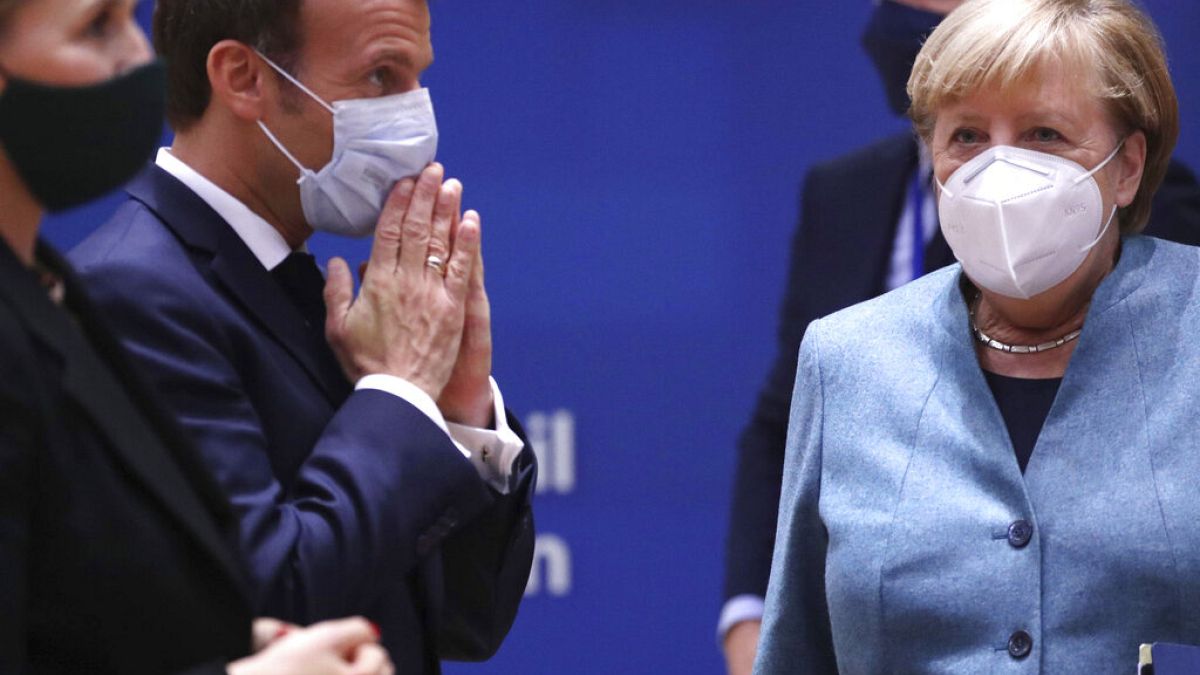Draft conclusion prepared ahead of the summit called on talks with the UK to be continued "intensively". But the conclusions agreed on Thursday merely said to "continue negotiations".
European leaders have urged the UK government to make the "necessary moves" to clinch an EU-UK free trade deal.
EU chief Brexit negotiator Michel Barnier said Brussels was "determined to reach a fair deal, but not at any price".
He said there continued to be differences between London and Brussels over governance, fisheries and the so-called level-playing field, which means a set of common rules and standards that are used to prevent businesses in one country undercutting their rivals in another.
At a summit in Brussels, the 27 European heads of state signed off on a statement calling on Barnier to continue negotiations with the UK.
But there was nuance in the language used. Draft conclusion prepared ahead of the summit - and seen by Euronews - called on talks with the UK to be continued "intensively". But the conclusions agreed on Thursday merely said to "continue negotiations".
The language was noted by the UK's Brexit negotiator David Frost, who said on Twitter that he was disappointed and surprised by the EU conclusions. He added the UK Prime Minister Boris Johnson would respond on Friday.
“The problem is at the moment both sides are looking at each other in the eye. Neither wants to move first or too quickly," said Georgina Wright from the Institute for Government in London.
She believes the summit outcome is another reminder that the EU will find it hard to approve a deal if the withdrawal agreement is not applied in full. Wright also believes the EU won’t climb down from their tough stance on fish until the UK plays ball on their red lines, like governance and the level playing field.
Despite the strong statement from EU leaders today, talks between London and Brussels are ongoing and will resume next week, even though there is no set agenda, a source told Euronews.
Brexit deadlock
Earlier on at the summit on Thursday, French President Emmanuel Macron said fishermen cannot be the sacrifices of Brexit.
Among the blockages to a deal, is the battle for control of fishing rights.
Macron also once again reaffirmed that Paris was "ready" for a "non-agreement" with London "if there are no good terms found at the end" of these negotiations.
German Chancellor Angela Merkel said the EU was seeking "a fair deal that benefits both sides", while Charles Michel, president of the European Council, reiterated the sticking points over a deal: fisheries, governance and the so-called "level-playing field", which means a set of common rules and standards that are used to prevent businesses in one country undercutting their rivals in another.
Speaking to Euronews, Jacob Kirkegaard from the German Marshall Fund believes the EU is willing to walk away from a deal if it does not meet their red lines.
‘They (the EU) feel they have done their compromising and that Boris Johson is relatively weaker than they are”. For Kirkegaard, the EU actually wants to push the final deadline to mid-November as they expect Biden to win the election which would "further isolate Boris Johnson and Brexit Britain politically".
'WTO is not hell, it's like third division football'
Trading between the EU and the UK on WTO terms is not exactly “hell” but it’s far from sensible or necessary, says the former head of the WTO, Pascal Lamy.
The EU and UK have been locked in negotiations on their future relationship for several months but have failed to produce any meaningful path towards achieving a free trade agreement.
The UK set an October 15 deadline for reaching a deal.
If no free trade deal is agreed, the two will fall back onto WTO terms which will require expensive tariffs, high-cost bureaucracy and damage already badly strained relations.
“WTO is not hell. It’s like the third division of the football league is still football”, Lamy told Euronews.
“But it’s not the second division or the first division which the internal market is. So there will be a cost for both sides,” he said.
A no-deal scenario is bad news for both sides, but particular industries like agriculture and the motor industry in the UK will bear a high burden due to the tariffs that will apply.
“Given the proportion of the economy on the continent and the UK economy, the cost of having to impose tariffs and run these bloody tariffs,” said Lamy.
“It’s not just a case of saying you know, I put a ten per cent tariff on cheese or on cars. You need a whole system to make it work. And this is very complex.
“So, I think at the end of the day – they should - and I’m speaking to the Brexiteers. They should understand that this cost is not necessary.”


